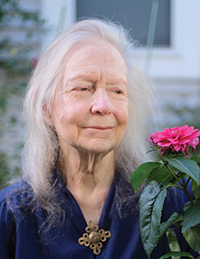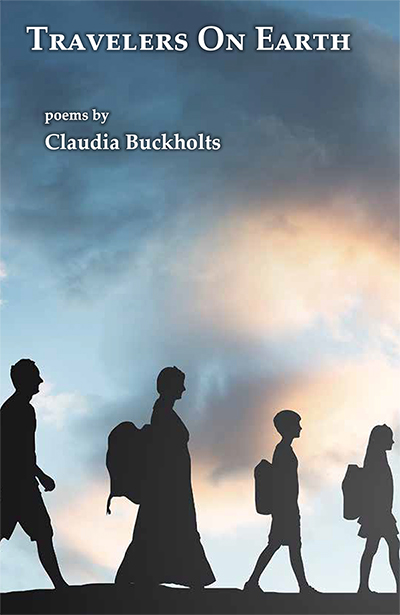Travelers on Earth
poetry by
Claudia Buckholts
~112 pages, $16 (+ shipping)
Release Date: May 2, 2023
The Advance Sale Discount on this title has expired. For those who prefer to pay by check, the price is $20/book (which includes shipping) and should be sent to: Main Street Rag, PO BOX 690100, Charlotte, NC 28227-7001.
PLEASE NOTE: Ordering in advance of the release date entitles the buyer to a discount. It does not mean the book will ship before the date posted above and the price only applies to copies ordered through the Main Street Rag Online Bookstore.
 Claudia Buckholts is the author of two previous collections of poems, Bitterwater and Traveling Through the Body. She received Creative Writing Fellowships from the National Endowment for the Arts and Massachusetts Artists Foundation, and the Grolier Poetry Prize. Her poems have appeared in Indiana Review, Minnesota Review, New American Writing, Prairie Schooner, The Southern Review, Verse Daily, and many other journals. She edited the Cambridge poetry magazine, Gargoyle, and directed a weekly poetry workshop at Phillips Brooks House at Harvard, which hundreds of poets attended over the years.
Claudia Buckholts is the author of two previous collections of poems, Bitterwater and Traveling Through the Body. She received Creative Writing Fellowships from the National Endowment for the Arts and Massachusetts Artists Foundation, and the Grolier Poetry Prize. Her poems have appeared in Indiana Review, Minnesota Review, New American Writing, Prairie Schooner, The Southern Review, Verse Daily, and many other journals. She edited the Cambridge poetry magazine, Gargoyle, and directed a weekly poetry workshop at Phillips Brooks House at Harvard, which hundreds of poets attended over the years.
Lyrical, mysterious, the poems in Travelers on Earth are infused with the authenticity of myth, the tension between sorrow and beauty. Whether responding to political situations or to more personal grief, their imagery astounds, turning the world into something both familiar and strange. In “Two Travelers,” for example, the poet describes waking: “It was morning, the burnt dials/of our faces moved against sleep.” Again and again, whether evoking afternoon along the Charles River or morning in Marrakech, the poet performs this alchemy. In “The Technique” Buckholts portrays a meditative experience from which “when you return, as you must, to this life,/nothing will be what it was.” Readers will similarly be transformed by these poems. Travelers on Earth is balm, awakening, renewal. ~Kathleen Aguero, author of World Happiness Index
What interests me most about the poems in Claudia Buckholts’ new book is the way they follow the tracks the mind makes as it moves. Her finely crafted lines and carefully observed descriptions are lit up by some very beautiful and striking images, but it is the sinuous trail left by the logic of association that gives the poems their meditative depth and subtlety. ~Chase Twichell
Claudia Buckholts is one of the best contemporary poet writing in the United States today. Her voice in this book is profound, lyrical and distinct. Her work provides a “mirror of feeling” for all kinds of emotions, sensations and attitudes that touch the very bone and marrow of candor and darkness in all of us. She neglects nothing of where she has been and where she is now. Travelers on Earth is an uncommon and brilliant book. ~James William Chichetto, author of Blood Accounts
The Summer in Oklahoma
In the morning the horses appeared
as I looked down from the attic window,
the red horse leading the bay,
and the pale horse running behind.
For a whole day they were ours,
my sisters and I rode them over the fields.
All this was long ago, the morning,
the blossoming of the light,
its fervor withheld no longer,
before the shadows appeared
in their strange syncopations,
before death appeared in the world
to trudge the weary trajectory of the stairs
and stand looking down over the fields.
Last night I dreamed of the horses again.
They gallop in a bright ring,
one after another, none losing its place,
always the same distance apart.
Now the rider pulls on her dark reins
and for a moment the horses move
to the perfection of that music
which is unheard, though hoped for
in every place. Now I remember
the gaze of noon, transparent,
shedding its far white light
over the shrouded fields, the rectangles of green,
over the spreading river between.
The possibility of grace
had never seemed so near, the sunflowers
lifting their enormous heads
by the farmer’s house, while the birds,
grosbeak, towhee, assemble, seeking their food:
seeds, plucked out in the morning, fall to earth
in the daylight field and rise in the field of night.
Two Travelers
In the morning we’ll be out of here, she said.
Yes, I said, and I couldn’t sleep
for thinking of how the mist
would lift from the hayfields,
how we would drive west past the town,
toward the setting sun,
past the daylight itself.
It was morning, the burnt dials
of our faces moved against sleep.
Get up, she said,
and for the last time in this place
I rose, rubbing the sleep from my eyes
like little crystals, each facet turning
to catch light in a thousand mirrors.
Only the foolish heart breaks, she said,
laying out my clothes on the bed.
I was only a boy then but I remember
socks striped and grey,
long trousers, stiff and uncomfortable.
I wore them that day but never since then.
We must hurry, she said,
and I took only a small suitcase.
She backed the car out of the driveway
for the last time,
she pressed down her foot
on the gas pedal. A line of black birds
sat on the telephone wires
watching us as we went away.
Don’t look back, she said,
as I turned in my seat and saw
behind me the farmhouse gone,
the whole countryside burning with autumn,
and I could not speak of the strangeness
I felt, leaving all that I knew of my life,
not knowing if I would ever have
any other. Don’t cry, she said,
as I leaned my head against the window,
and the wind was so strong it blew
my tears back into my eyes,
where I would keep them from then on.
It has been years, and this is the life
to which she has led me, where nothing stays
out of the mist for long
and we never reach any place
that seems to be real. We always go away
just when reality might be beginning.
We always have to go on.
Get up, she says, it is time to go.
Transportation
In the farmland across from the house
three brown horses stand in a field.
A taxi with a single passenger
swerves up to the house, its tires repeating
scrimmage on the gravel.
From a worn porch table spread with seeds,
the birds, alarmed, fly up,
a bright cardinal among the sparrows.
The wife comes back alone. In the hospital
her husband dozes, wrapped in a mosaic of tubes,
exiled in the body’s kingdom,
alone among its white ministers.
The murmur of fluid in his lungs,
susurrus of the sea within,
drowns out every sound, his flesh returning
to the first ocean. Now she sees
the hospital room transformed: a space station
ringed with coils and vapor locks,
an orbiting silence
tenuous with instruments and calibrations;
and in the field she sees
white tufted seeds of milkweed
lift off like gauze and then float free.
The Workmen
They are still there, the workmen.
I hear them downstairs,
and in the grave of ten years
I hear them,
the sound of their hammers
breaking the stone,
the sound of their voices
loud at the edge of noon,
and I understand what my love has been,
a presence large as the sky.
The workmen are breaking
the house apart, wood chips, stones
fly up in the air
but I will not need
this house any longer.
I will step forth on earth
without shelter.
My feet will be bare,
I will need nothing.
Let me live where everything
is open to the sky and rain.
I will sleep in the forest
where light flows
in the branches of leaves,
in the long grass.
Let the workmen go on
hammering and breaking down.
Let them sing the songs
of the exterior life.
I will not sing them
but a long echo
moving in my bones
shall sing
in the silences of god.


 Claudia Buckholts is the author of two previous collections of poems, Bitterwater and Traveling Through the Body. She received Creative Writing Fellowships from the National Endowment for the Arts and Massachusetts Artists Foundation, and the Grolier Poetry Prize. Her poems have appeared in Indiana Review, Minnesota Review, New American Writing, Prairie Schooner, The Southern Review, Verse Daily, and many other journals. She edited the Cambridge poetry magazine, Gargoyle, and directed a weekly poetry workshop at Phillips Brooks House at Harvard, which hundreds of poets attended over the years.
Claudia Buckholts is the author of two previous collections of poems, Bitterwater and Traveling Through the Body. She received Creative Writing Fellowships from the National Endowment for the Arts and Massachusetts Artists Foundation, and the Grolier Poetry Prize. Her poems have appeared in Indiana Review, Minnesota Review, New American Writing, Prairie Schooner, The Southern Review, Verse Daily, and many other journals. She edited the Cambridge poetry magazine, Gargoyle, and directed a weekly poetry workshop at Phillips Brooks House at Harvard, which hundreds of poets attended over the years.